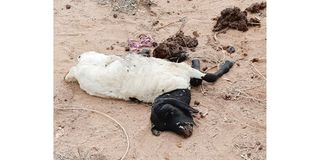Hasten the offtake programme, Tana pastoralists urge State

Dead Carcasses in the Wayu Village fields, Tana River County.
Pastoralist communities in Tana River County are decrying more losses as the livestock offtake programme drags on.
More than 2,000 animals have succumbed to the drought, according to reports by the National Drought Management Authority (NDMA).
Each day households report at least 15 deaths of livestock.
Herders come back from the wilderness empty-handed each day, after losing their animals to starvation and thirst.
In homes in Wayu ward, families use sticks to support livestock to their feet in the morning, while calves are fed processed milk from shops.
Hundreds of families are at risk of dehydration from consuming salty water.
"The government announced an offtake programme, and since then we have lost 300 animals. The programme will be of no use if all animals die," says Abdi Shambaro.
The county administration, he says, has not lived up to its promise to deliver water and residents have resorted to salty water.
He notes that for the livestock at home, owners buy bottled water and give them a little to quench their thirst and live for the day.
"The sun is scorching. The county truck delivers the water to people with money. By the time it gets here, it barely has enough for 20 people," he says.
Residents note that even when delivered, the water is not free as they buy it for Sh50 for a 20-litre container.
They note that their leaders have abandoned them, and have never visited to witness their losses or even heard them push for help.
"I elected someone to represent me. He comes from around here but I am yet to hear his appeal for help for us. I feel disappointed," says Hassan.
In a small reservoir, hundreds of women and their children are gathered with jerricans to draw salty water.
The project was set up by a humanitarian organization. Because of low pressure, the water cannot get to the tanks.
As a result, residents have broken the pipe and tap water from it.
To have an equal share, they have dug up two troughs, where water flows as they fetch it.
However dirty, it is worth the trouble as they don't have an alternative.
"Once I have fetched it like this, I will have to let it settle for a day and a half then decant it," says Halima Abdi.
Sometimes, she says, they fetch water not for use but just to feel content that it is available in the house and can save a life.
She reveals that women sometimes forgo baths for a day or two to save the little they have.
Diseases are also being reported as residents strive to survive.
"We are in a tight spot - inadequate water, no livestock insurance, and no food. We will soon start losing people if the government does not respond quickly," says area MCA Sadaam Hussein.
Malnutrition is rising, he says, and children will soon be casualties of the drought.
He also notes that the elderly are at risk of dying while young people suffer depression as a result of the daily losses of livestock.
"Most of these people who are losing animals are the youth. One young man losing 30 cows is not an easy issue. The government should hurry the offtake and figure out compensation for these people," Mr Hussein says.
NDMA coordinator Abdi Musa notes that help is on the way.
"The Kenya Meat Commission is coming for 750 cows. It is not enough but we are optimistic there is a better one coming as well," he says.
Meanwhile, the Food and Agriculture Organization has started supplying 8,000 bags of livestock feed to affected areas.
The Red Cross will also start distributing food this week.





